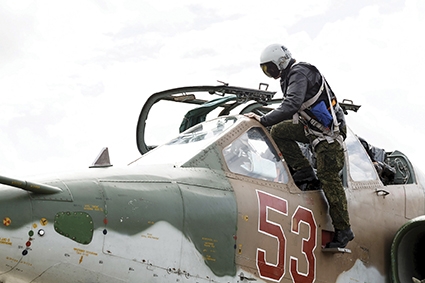Russia’s Unlikely Withdrawal from Syria
Op-Ed
The Russian entrance in the Syrian war has certainly increased the reputation of the Russian military, allowed valuable training, and enhanced Moscow’s political clout in the conflict itself and the Middle East overall. Still, even though Bashar al-Assad’s regime managed to survive and even become stronger, Moscow is looking at ways to get out of the Syrian war. Yet, this will be very difficult to see through as Russia would face considerable geopolitical constrains in doing so.
Despite earlier reports from 2016 of Russia withdrawing its forces from Syria, Moscow is now openly hinting at closing off its operation in the Syrian battlefield. One of the latest signs that the Kremlin is exploring possible exit strategies came during a recent visit by the Syrian president Bashar al-Assad, to Sochi, Russia, where he met Putin and the latter expressed his satisfaction with the military operation in Syria. Putin also said that the war is nearing an end.
In October, Russian media outlets announced that the future of the Russian involvement in Syria was discussed at the meeting in Tel Aviv between Russian Defense Minister Sergei Shoigu and his Israeli counterpart, Avigdor Lieberman. The Russia minister said that the Russian operation in Syria is nearing its completion. Moreover, the Russian presidential press secretary Dmitry Peskov also noted that Russian military successes in Syria and described them as “the beginning of the end” of the war in Syria.
Yet another sign came on November 22, when the Russian, Iranian and Turkish presidents met and released a joint statement on the future of Syria. The leaders agreed to organize a “congress” involving the Syrian government and Syrian opposition forces.
Indeed, since Russia's intervention in Syria, Moscow has succeeded in many ways to stabilize the Syrian battlefield by providing the loyalist forces with concrete military support for future operations. For one, Russia's involvement restored the military advantage to Syrian troops. Furthermore, its entry into the conflict not only secured the existing Russian military infrastructure on the Mediterranean, but also allowed it to expand. Moreover, the military successes increased Moscow's geopolitical weight, making the country one of the major players in the Syrian conflict, and, through its participation in the war, it also weakened any serious potential for fighters in Syria and Iraq to increase their operations across most of the post-Soviet space and in Russia itself.
There do exist additional strategic reasons for Russia to leave the Syrian battlefield now. For example, Moscow's relations with important Syrian rebel backers such as Turkey and the Gulf Cooperation Council have been shaken since Russia’s intervention in 2015. From the Russia point of view, re-establishing former contacts with these Middle East countries will be a profitable foreign policy move for the country’s economy. Relations with Turkey are developing fast and many believe that this might come at the cost of Russia leaving its positions in Syria.
Beyond that, there is also a purely psychological reason: Russian support for the Syrian government has come at a price as the rate of Russian military casualties has steadily risen over the past several months, resulting from greater Russian military involvement in the Syrian battlefield.
Related to that is the Russian fear that Moscow might be stuck in Syria for a long time, increasing the potential for more casualties. The Russians are still haunted by Soviet misfortune in Afghanistan in the 1980s and believe that the time is now ripe for withdrawal as Moscow amid its various Middle East successes.
But there are serious constrains on Russia. Moscow needs a negotiated political resolution to the conflict where Moscow’s position would be strong enough to safeguard its military and political influence. There is also a real possibility that potential Russian withdrawal would look like what happened in 2016 when President Putin ordered the immediate pullout of the bulk of his forces from Syria after 5½ months of airstrikes. However, it is also remembered that back then this was only used by the Russians to regroup their forces in Syria to further continue their operations alongside the Syrian loyalists and Iranian allies on the ground.
To look at the potential Russian withdrawal from the bigger strategic view, one should remember that the Russians also entered the war in Syria with the hope that by gaining momentum on the Syrian battlefield, the West would become more amenable to Russian interests in other conflicts around the globe.
One such conflicts is Ukraine. The Kremlin’s intentions appear clear: political leverage in Syria would influence the West’s negotiating position in Ukraine, which remains the most crucial theater for Russia’s position in the Eurasian landmass. However, so far, the West has successfully blocked these Russian initiatives.
Emil Avdaliani teaches history and international relations at Tbilisi State University and Ilia State University. He has worked for various international consulting companies and currently publishes articles focused on military and political developments across the former Soviet space and the Middle East.
Emil Avdaliani
Photo source: pix.avaxnews.com












